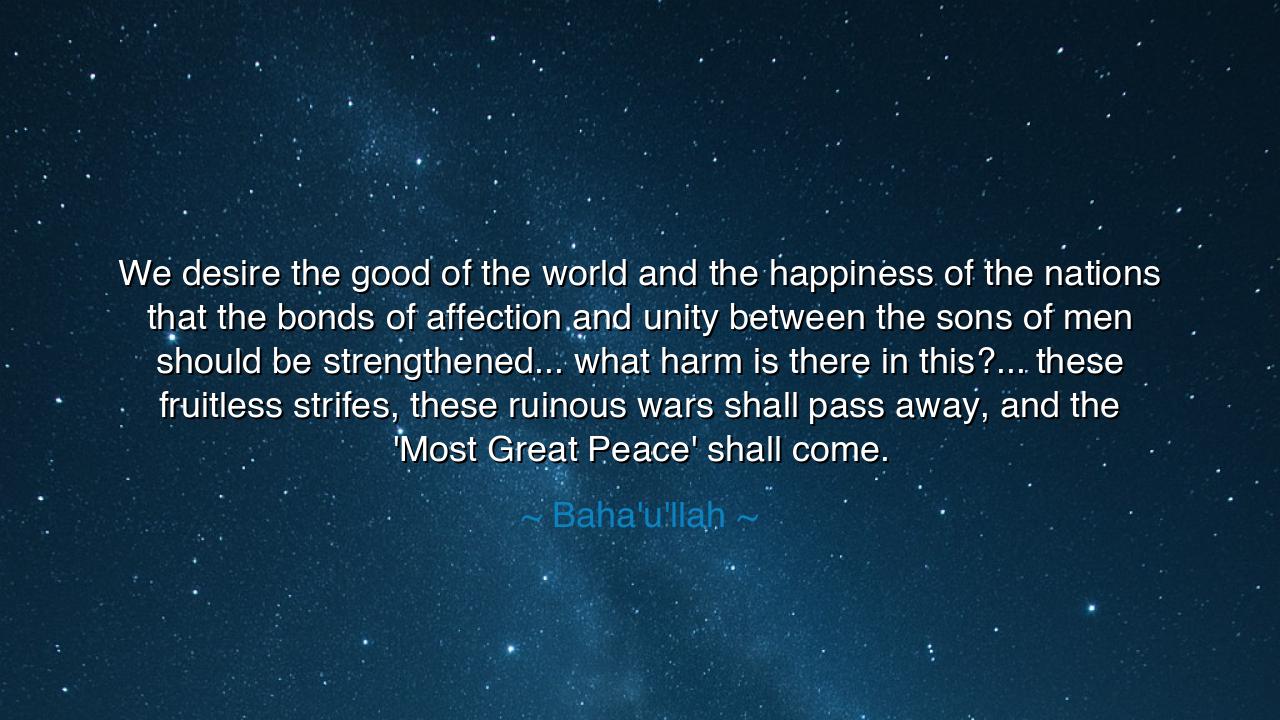
We desire the good of the world and the happiness of the nations
We desire the good of the world and the happiness of the nations that the bonds of affection and unity between the sons of men should be strengthened... what harm is there in this?... these fruitless strifes, these ruinous wars shall pass away, and the 'Most Great Peace' shall come.






“We desire the good of the world and the happiness of the nations that the bonds of affection and unity between the sons of men should be strengthened... what harm is there in this?... these fruitless strifes, these ruinous wars shall pass away, and the ‘Most Great Peace’ shall come.”
Thus spoke Baha’u’llah, the herald of unity and peace, whose words shone forth in an age torn by division and conquest. In this luminous declaration, he reveals the longing of a divine heart — the yearning for the good of the world, for the happiness of nations, and for the binding together of humanity in a single fellowship of compassion and justice. His words are not the dream of an idealist; they are the command of a prophet, uttered in the darkness of conflict to remind the world that peace is not a fantasy but a destiny.
The origin of this sacred utterance lies in the nineteenth century, when Baha’u’llah, imprisoned and exiled for His teachings, wrote to kings and rulers across the earth. From the walls of His prison in Acre, He called out not for vengeance, but for unity. He saw the nations arming themselves for destruction, the religions quarreling over dogma, the powerful crushing the weak — and yet, He spoke not in despair, but in hope. He proclaimed that humanity was one family and that the time had come for its maturity: for the nations to lay down their swords and bind themselves with the bonds of affection. “The Most Great Peace,” He foretold, would come — not through domination, but through love, justice, and the recognition of our common divine origin.
Baha’u’llah’s message was revolutionary, for He declared that the same sun shines upon all, that the same divine breath animates every soul, and that no race, creed, or nation can claim superiority over another. He saw that the strifes and wars of mankind were but the diseases of the human heart — the fever of pride, the blindness of greed, and the sickness of prejudice. To heal them, He prescribed not political treaties nor military strength, but the medicine of unity: the awakening of a spiritual consciousness that sees in every man a brother, in every woman a sister, and in every nation a partner in the building of a peaceful world.
Consider the story of Mahatma Gandhi, who, decades later, would embody this same spirit of peace. Though not a follower of Baha’u’llah, Gandhi’s heart echoed His teaching. He faced an empire with nothing but truth and nonviolence, declaring that the true victory is not to destroy one’s enemy, but to transform him into a friend. Like Baha’u’llah, Gandhi believed that the path to peace lies in moral courage and love. And though both men suffered exile and imprisonment, their faith never dimmed, for they understood that the seeds of peace often grow first in the soil of suffering. Their lives became living proofs that unity is not weakness, but the highest form of strength.
Baha’u’llah’s words, “what harm is there in this?” strike like a challenge to the conscience of humanity. He asks, why should peace be feared? Why should love be mocked as naïve? The world has spent centuries building empires, armies, and weapons — and what has it gained but ashes and grief? Fruitless strifes have bled nations dry, ruinous wars have left widows and orphans crying to the heavens. In this quote, Baha’u’llah confronts the arrogance of the world and lays before it a simple truth: that the destiny of mankind is not perpetual conflict, but harmony. The storms of war, He promises, shall pass away, for they are but the last convulsions of a dying age, giving birth to a new world illumined by the Most Great Peace.
But this peace will not descend unbidden from the heavens. It must be built by human hands, guided by awakened hearts. Baha’u’llah teaches that peace begins in the soul — that no nation can be at peace until its citizens are at peace within themselves. To seek the good of the world is to begin with the good of one’s neighbor; to desire the happiness of nations is to cultivate compassion, justice, and understanding in our own lives. The temple of peace is constructed stone by stone: by forgiveness where there was anger, by dialogue where there was silence, by empathy where there was fear.
So, my child, take these words as both promise and command. Work for the unity of mankind. Let no barrier of race, creed, or class divide your heart. When you see hatred, answer it with kindness; when you see ignorance, respond with patience; when you see war, labor for understanding. Do not believe that your efforts are small, for each act of love is a spark in the dawn of the Most Great Peace. As Baha’u’llah teaches, the destiny of the world is not despair — it is the awakening of the human spirit.
And remember this always: the peace He foretold is not the stillness of defeat, but the harmony of creation fulfilled. When the hearts of men are cleansed of prejudice, when the nations of the earth stand not as rivals but as brothers, when affection and unity are the language of all peoples — then, and only then, shall humanity see the day when “these fruitless strifes and ruinous wars shall pass away,” and the radiant dawn of the Most Great Peace shall rise over the world, never to set again.






AAdministratorAdministrator
Welcome, honored guests. Please leave a comment, we will respond soon